Electrolytes are ionic substances dissolved in water with a negative or positive electrical charge. Due to their electrical charge, they regulate chemical reactions inside our bodies, maintain blood pH and pressure, help with sweating, and improve muscle and nerve function.
Although there are many electrolytes in water, the term primarily refers to healthy minerals such as calcium, potassium, sodium, magnesium, chloride, phosphates, sulfates, and bicarbonates.
Most of these minerals play a role in blood and oxygen flow and muscle and nerve function, so athletes and those engaged in heavy workout routines opt for electrolyte-rich water.
We evaluated many bottled water brands and curated a list of electrolyte water brands that you should consider drinking.
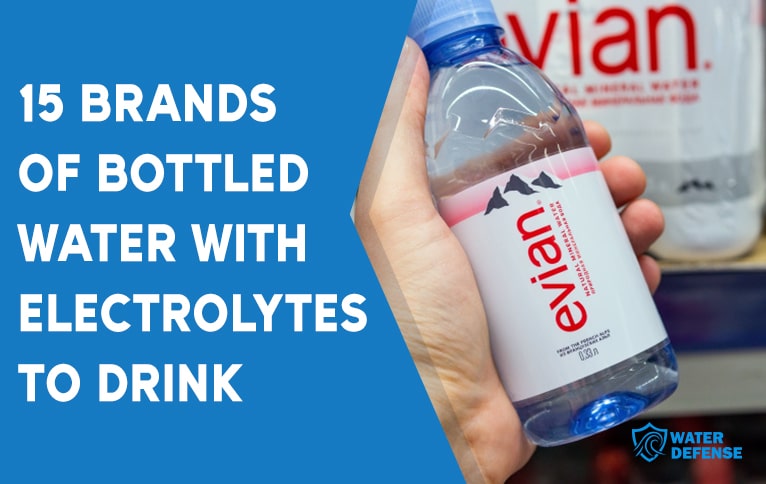
Electrolytes Bottled Water Comparison
| Electrolyte Water Brand | Type | Electrolytes | pH | Buy online |
|---|---|---|---|---|
| Glaceau Smartwater | Purified Water + Electrolytes | Calcium, Magnesium, Potassium | 7 to 7.5 | Get it Here |
| Essentia | Purified Water + Electrolytes | Sodium bicarbonate, Dipotassium phosphate, Magnesium sulfate, and Calcium chloride | 9.5 | Get it Here |
| Evian | Spring Water | 360 mg/L of Bicarbonates and 80 mg/L of Calcium, 26 mg/L of Magnesium, and 10 mg/L of Chloride | 7.2 | Get it Here |
| Vichy Catalan | Spring Water | 1,097 mg/L sodium, 584 mg/L chloride, 51 mg/L potassium, | N/A | N/A |
| Core Hydration | Purified Water + Electrolytes | Potassium bicarbonate, Magnesium chloride, and Calcium chloride | 7.4 | Get it Here |
| Gerolsteiner Naturell | Mineral Water | 348 mg/L Calcium, 108 mg/L Magnesium, 1,816 mg/L Bicarbonates, 11 mg/L Potassium, and 40 mg/L Chloride | 5.2 – 6 | Get it Here |
| LIFEWTR | Purified Water + Electrolytes | Magnesium sulfate and Potassium bicarbonate. | 6.4 – 7.4 | Get it Here |
| San Pellegrino | Mineral Water | 160 mg/L calcium, 53 mg/L magnesium, 47 mg/L chloride, 410 mg/L sulfates | 5.6 | Get it Here |
| Badoit | Mineral Water | 190 mg/L calcium, 85 mg/L sodium, 40 mg/L sulfates, 40 mg/L chloride, 10 mg/L potassium | 6 | N/A |
| VitaminWater | Purified Water + Electrolytes + Vitamins | Potassium phosphates, Calcium, Magnesium. Vitamins: vitamins A, C, E, B3, B5, B6, and B7 | N/A | Get it Here |
| Three Bays | Mineral Water | 64 mg/L calcium, 92 mg/L magnesium, 300 mg/L bicarbonates, 47 mg/L sulfates, 450 mg/L chloride, 47 mg/L silica | 8.3 | Get it Here |
| BodyArmor SportWater | Purified Water + Electrolytes | Potassium Bicarbonate, Calcium Chloride, Magnesium Chloride. | 8.1 – 9 | Get it Here |
| ROI | Mineral Water | 1,300 mg/L magnesium, 2,100 mg/L of sulfates, 600 mg/L of calcium, 83 mg/L of chloride, and 24 mg/L of potassium | N/A | N/A |
| Waiākea | Mineral Water | 7 mg/L calcium, 4 mg/L magnesium, 4 mg/L sulfate, and 2 mg/L potassium. It also contains 44 mg/L silica. | 7.6 – 8.2 | Get it Here |
| Mananalu | Purified Water + Electrolytes | Magnesium sulfate, calcium chloride, and potassium bicarbonate | N/A | Get it Here |
What are the Best Electrolytes Water Brands?
- Glaceau Smartwater
- Essentia
- Evian
- Vichy Catalan
- Core Hydration
- Gerolsteiner Naturell
- LIFEWTR
- San Pellegrino
- Badoit
- VitaminWater
- Three Bays
- BodyArmor SportWater
- ROI
- Waiākea
- Mananalu
Glaceau Smartwater
Some bottled water brands are on a mission to produce water most suitable for the hydration needs of athletes, and Glaceau Smartwater is one of such brands.
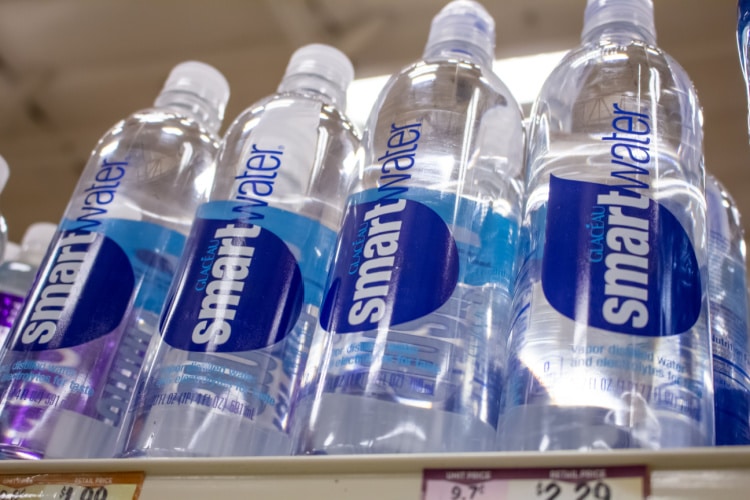
Glaceau Smartwater goes through distillation to remove contaminants and impurities, after which the water is then ionized by adding a balanced mix of calcium, magnesium, and potassium. Not only do these minerals fill the water with electrolytes, but they also give it a fresh and crisp taste.
Another benefit of Glaceau Smartwater is that it doesn’t contain sodium, which makes it a healthy choice for people with cardiovascular issues.
Lastly, Glaceau Smartwater has a neutral pH of 7 to 7.5. If you’re looking for more alkalinity in your water, there’s also alkaline water with 9.5 pH in the brand’s catalog.
Essentia
Essentia’s advertising campaign involves basketball, baseball, and football players, actors such as Millie Bobby Brown, and dancers, all leading physically active lives. Their campaigns perfectly illustrate the target group of Essentia’s highly ionized and electrolyzed alkaline water.
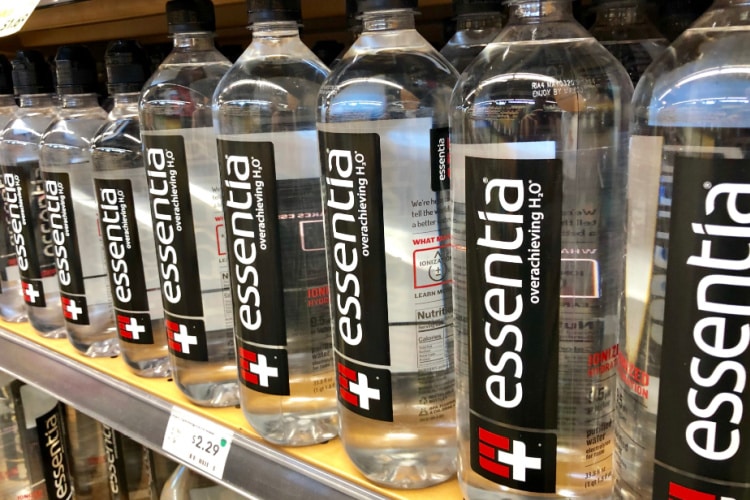
Essentia’s water is treated with micro-filtration and reverse osmosis to remove contaminants and impurities. After filtration, electrolytes such as sodium bicarbonate, dipotassium phosphate, magnesium sulfate, and calcium chloride, are then added to the water. The addition of these electrolytes makes Essentia one of the most electrolyte-rich and alkaline bottled water brands on the market, with a pH level of 9.5.
Evian
Unlike Glaceau Smartwater and Essentia, Evian’s water is from a natural spring water, which is contaminant free and doesn’t require treatment before bottling. The water is sourced from a spring in Évian-les-Bains, a French town near the French Alps.
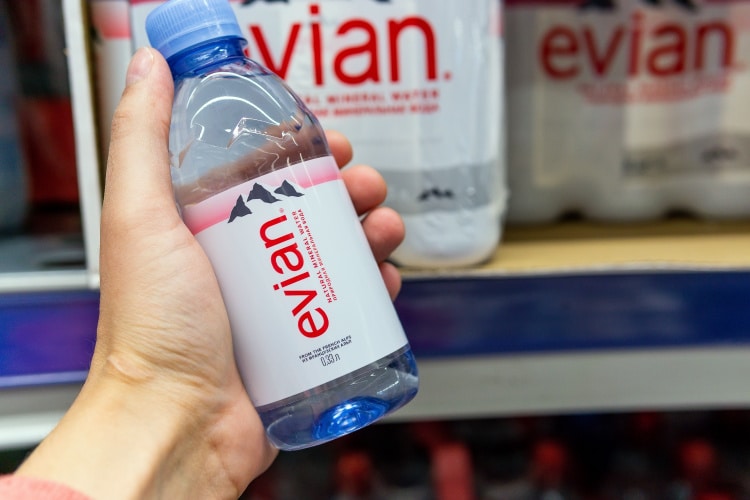
This spring water is the product of the snowmelt from the French Alps — which flows underground through rock and glacier formations. These formations naturally rid the water of potential contaminants and give it high mineral content.
Evian water’s electrolyte content is 360 mg/L of bicarbonates and 80 mg/L of calcium, 26 mg/L of magnesium, and 10 mg/L of chloride. The water also has a neutral pH of 7.2.
Vichy Catalan
Bicarbonates and calcium are the most common electrolytes, so water that contains them isn’t hard to come by. However, the opposite is true for chlorides and potassium. Luckily, Vichy Catalan is a rare brand whose water is rich in both.
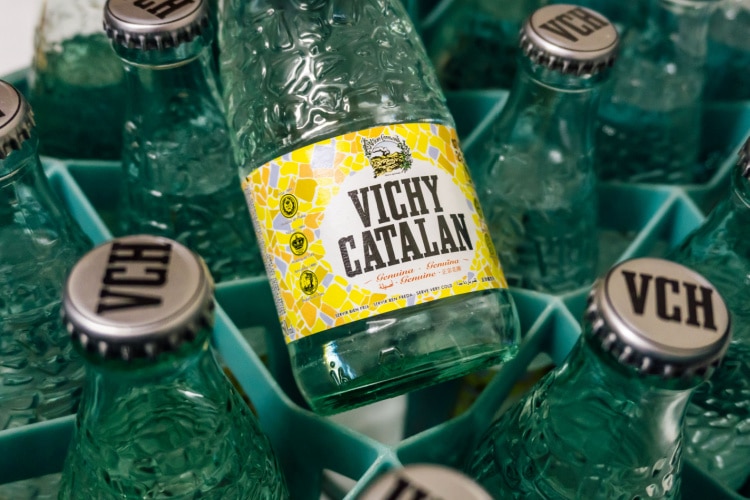
Hailing from Spain, Vichy Catalan has been one of the most popular mineral water brands globally since its founding 140 years ago. To a large extent, the brand owes its popularity to the unique electrolyte content of the water it sells.
In terms of bicarbonates, it’s at the top with 2,081 mg/L. Still, the real strength of this particular bottled water lies in its potassium and chloride composition, which is at 51 and 584 mg/L, respectively. Both numbers are unprecedentedly high when it comes to bottled water.
However, the water also has high sodium levels of 1,097 mg/L, so it’s not the ideal choice for people on a no, or low-sodium diet.
Core Hydration
As can be deduced from its name, Core Hydration is founded on a similar principle to Glaceau and Essentia: to give athletes the ultimate hydration by providing them with heavily treated water.
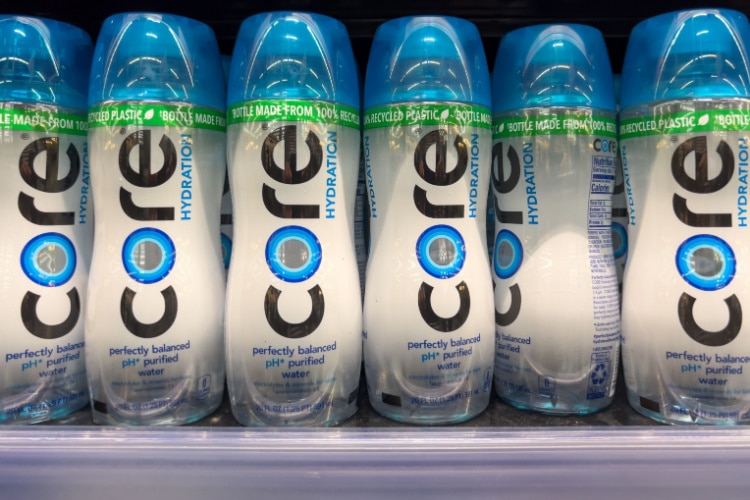
Core Hydration’s water is first purified in an undisclosed seven-stage process. The result is water free from contaminants (such as lead, arsenic, or volatile organic compounds) or potentially harmful elements (such as sugar, gluten, or sodium).
After purification, the brand adds its own blend of electrolytes containing potassium bicarbonate, magnesium chloride, and calcium chloride. These electrolytes give the water a distinct taste besides making it more athlete-friendly.
Additionally, it has a perfectly balanced pH of 7.4.
Gerolsteiner Naturell
With TDS level of 2,527 mg/L, Gerolsteiner Naturell has the highest naturally purified electrolyte water, second only to Vichy Catalan.
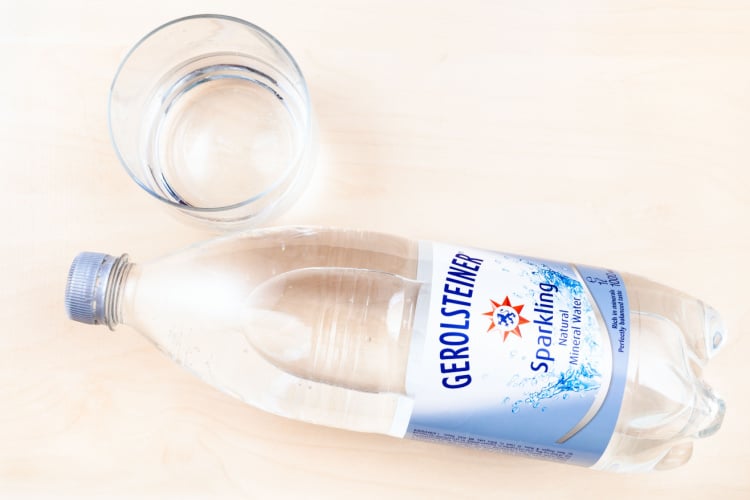
Authorities recommend a daily intake of 1,000 mg calcium and (more or less) 400 mg magnesium. Gerolsteiner Naturell contains 348 mg/L calcium and 108 mg/L magnesium. So, in just one litre, it packs about a third of the daily calcium and one-fourth of the daily magnesium intake recommendations.
It also contains 1,816 mg/L bicarbonates, 11 mg/L potassium, and 40 mg/L chloride, which covers all your electrolyte needs.
What’s better; unlike Glaceau, Essentia, or Core Hydration, Gerolsteiner Naturell is entirely untreated. Naturally purified and endowed with minerals by the volcanic craters of the Volcanic Eifel, it’s bottled directly at the source.
LIFEWTR
In a similar way to all the treated (meaning inorganic) electrolyte water brands, LIFEWTR aims to improve hydration and provide a distinct taste. Consumer experience, as well as our own, suggests they’re doing a good job.
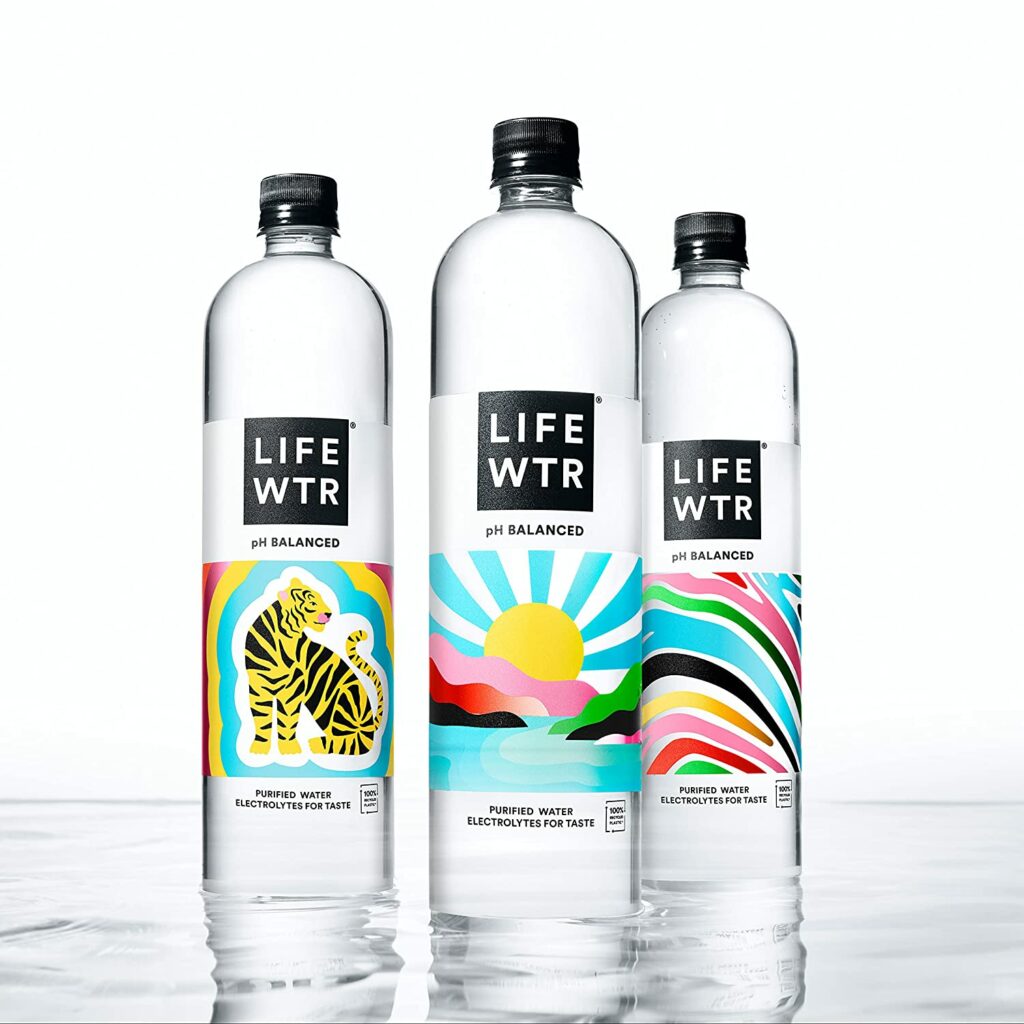
The LIFEWTR Premium goes through a reverse osmosis process. This process removes all impurities from the water source.
Electrolytes are then added after reverse osmosis filtration, but unlike other treated electrolyte water brands, LIFEWTR adds only 2 ingredients to their water; magnesium sulfate and potassium bicarbonate.
The water has a pH range of 6.4 to 7.4, which puts LIFEWTR in the category of acidic water brands.
San Pellegrino
The term ‘electrolyte’ is an umbrella term for different minerals with distinct functions and benefits for our bodies. While most help with sweating, oxygen flow, and blood pressure, sulfates assist us in digestion, which is no less important.
Thanks to its sulfate-rich body, the San Pellegrino mineral water is the number one choice if you’re looking for digestion-friendly water.
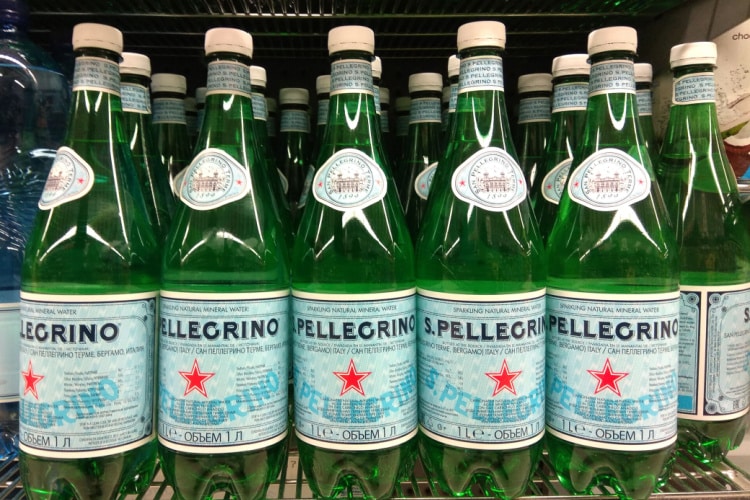
Like Evian, San Pellegrino relies on the Alpine Mountains for its sustainability. It’s sourced from the Italian Alps around the territory of San Pellegrino Terme, Val Brembana.
The water is naturally purified and reinforced with minerals thanks to the underground porous rock formations in the area around its source. As a result, the company only needs to bottle and distribute the mineral-rich spring water.
San Pellegrino’s water has the following mineral content:
- 160 mg/L calcium
- 53 mg/L magnesium
- 47 mg/L chloride
- 410 mg/L sulfates
It is also a naturally acidic water with a pH of 5.6.
Badoit
Badoit is a French mineral water brand often served by gourmets and high-end restaurants thanks to its high bicarbonate and sulfate levels that aids digestion. This makes it an excellent companion to heavy dishes.
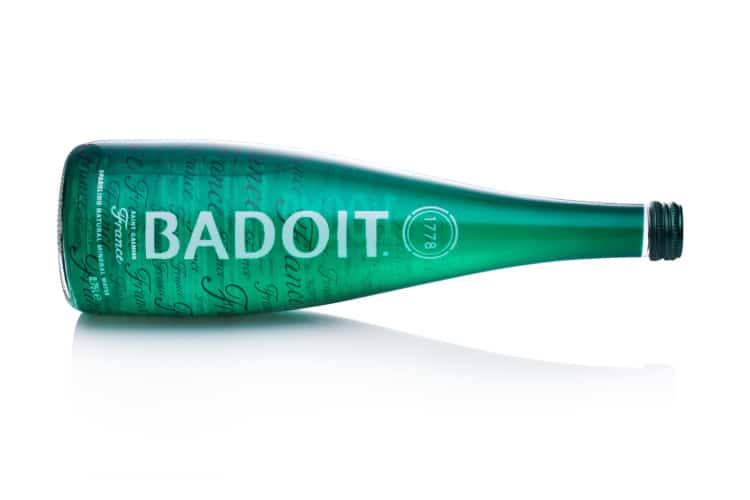
As we’ve seen with Vichy Catalan and Gerolsteiner Naturell, mineral water tends to have one mineral in excess and the others at relatively low levels. That’s not the case with Badoit, as it has a more balanced mineral content:
- 190 mg/L calcium
- 85 mg/L sodium
- 40 mg/L sulfates
- 40 mg/L chloride
- 10 mg/L potassium
Unlike other mineral water brands, Badoit water doesn’t have a bitter taste. The water tastes very light.
VitaminWater
VitaminWater is another inorganic, heavily-treated electrolyte water brand. It comes in two options: sugary and sugar-free. Both have added electrolytes and contain lots of vitamins, so if you want the most health-friendly electrolyte water, VitaminWater is a good choice.
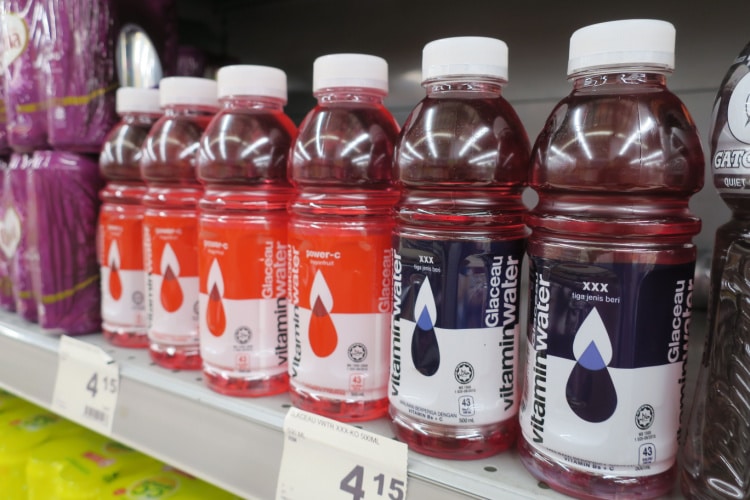
Like other treated water brands, VitaminWater subjects its water to heavy filtration, including micro-filtration and reverse osmosis. The brand then adds electrolytes such as potassium phosphates, calcium, and magnesium lactates to improve the taste. Vitamins such as vitamins A, C, E, B3, B5, B6, and B7, are also added to the water.
Other ingredients found in VitaminWater include zinc gluconate, sodium selenate, citric acid, phosphoric acid, and stevia leaf extract.
Although all these ingredients make this brand a favorite among athletes, its highly inorganic makeup could deter some.
Three Bays
Three Bays is an Australia-based mineral water brand. It bottles its water directly at the source on Victoria’s southern coast. Due to the water’s two millennia-long underground journey through natural purification and mineral sources, it has no contaminants, yet it contains many electrolytes.
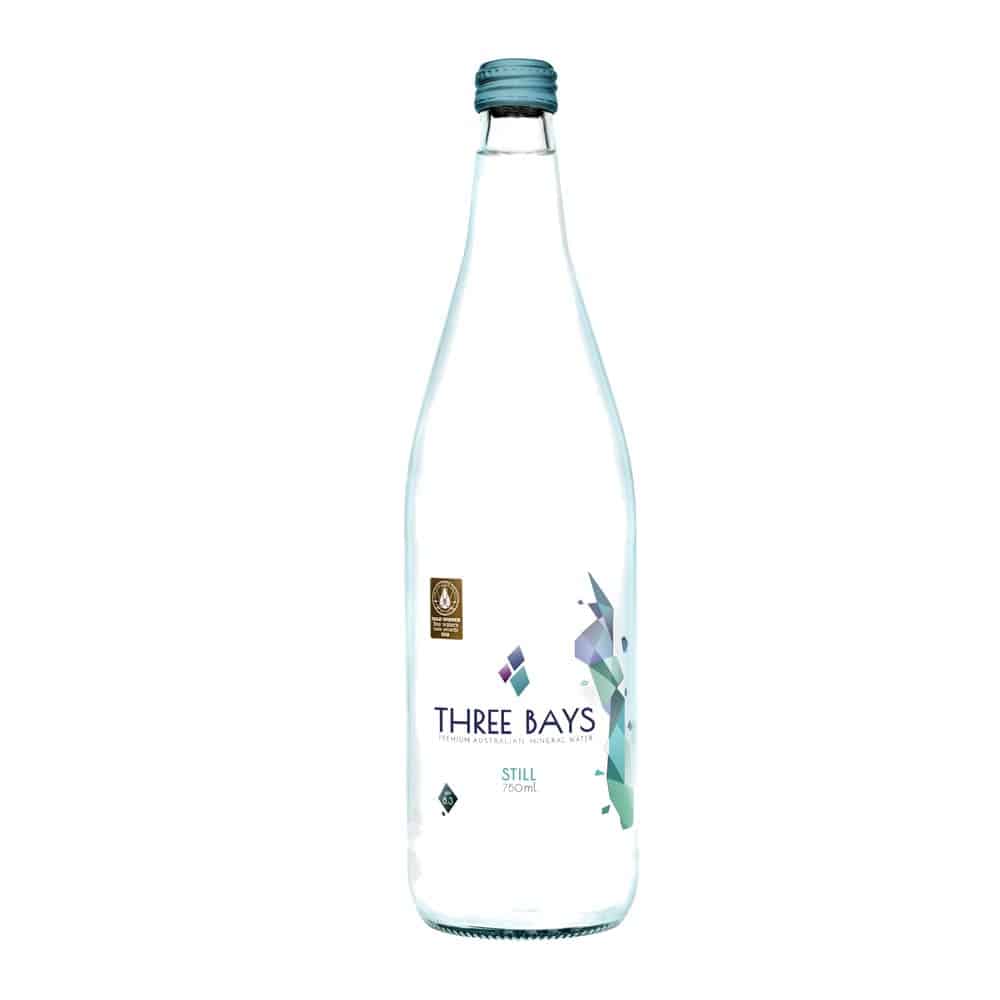
However, unlike other mineral water brands we evaluated, the mineral makeup of Three Bays is unique. It has more than 20 healthy electrolytes, albeit some in trace amounts, including zinc (which improves the immune system), iodine (assisting thyroid function), and the rarely found vanadium (helping with bone growth, blood sugar, and diabetes).
Three Bays also contains the following electrolytes:
- 64 mg/L calcium
- 92 mg/L magnesium
- 300 mg/L bicarbonates
- 47 mg/L sulfates
- 450 mg/L chloride
- 47 mg/L silica, a mineral known for giving water a slightly sweet taste and smooth texture.
Three Bays water has a pH of 8.3.
BodyArmor SportWater
The brand name says it all. BodyArmor produces a healthy sports drink that optimizes hydration while providing enough electrolytes to help you replenish your muscles and improve blood and oxygen flow.
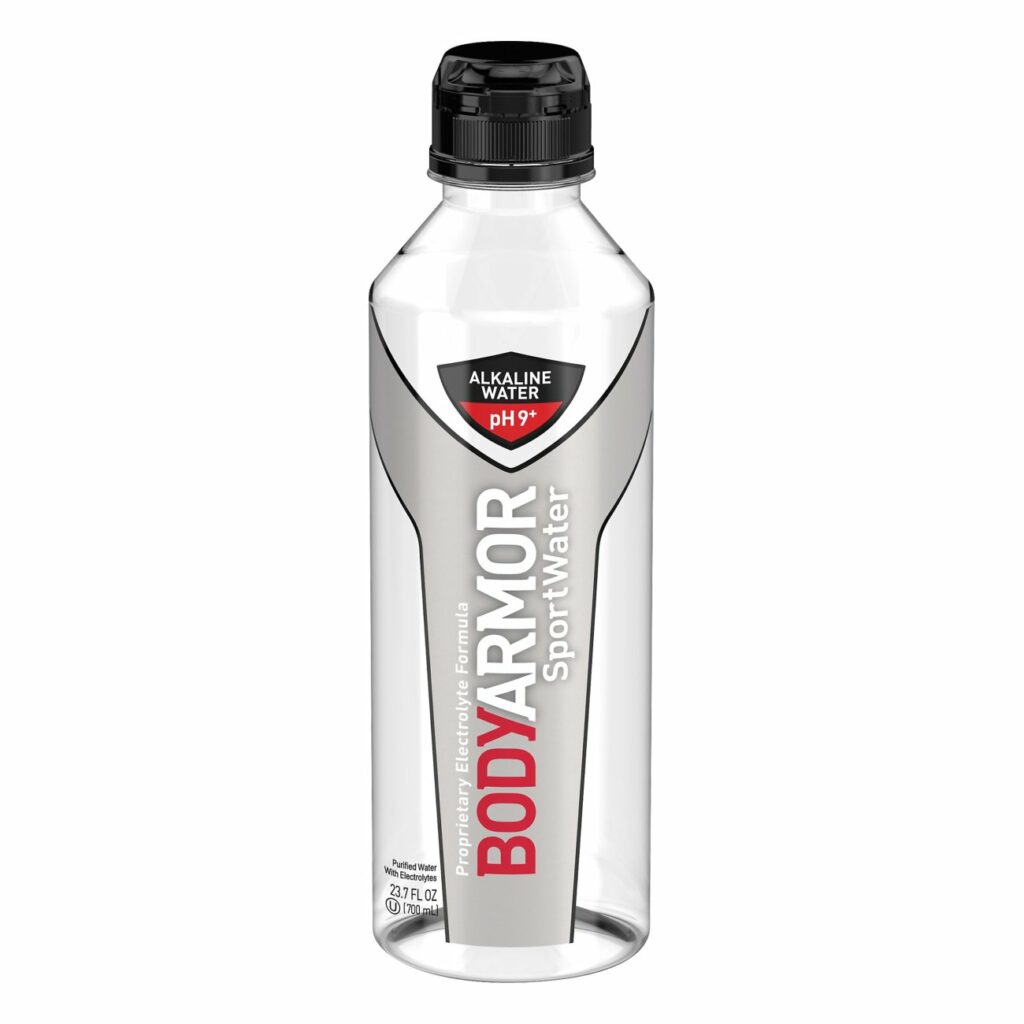
BodyArmor filters its water with a proprietary processes which includes reverse osmosis. In the post-filtration stage, the brand adds electrolytes and natural flavors, such as coconut, with no sodium or artificial sugar.
The electrolyte ingredients of the BodyArmor SportWater are potassium bicarbonate, calcium chloride, and magnesium chloride, emphasizing potassium-richness. It is also alkaline, with a pH of 8.1 to 9.
BodyArmor SportWater comes in many exotic flavors such as strawberry grape, orange mango, and tropical punch.
ROI
ROI, originating from Slovenia, distributes naturally electrolyte-rich water with an incredibly high TDS count of 7,481 mg/L.
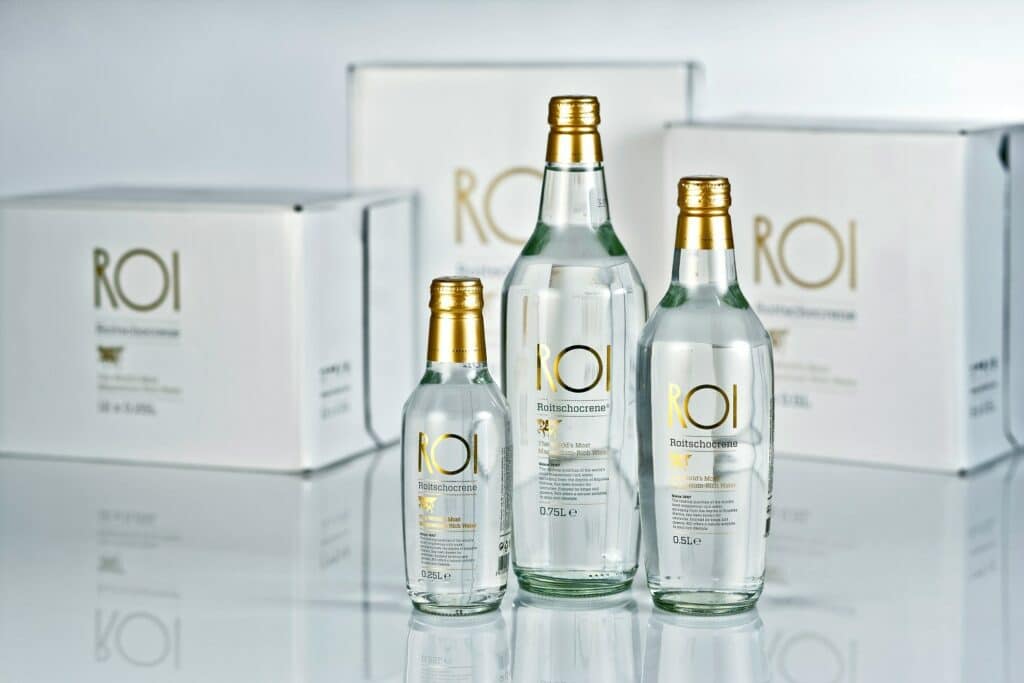
It is also the most magnesium-rich water on the planet, with 1,300 mg/L, surpassing our daily magnesium needs by 4 times. Additionally, it contains 2,100 mg/L of sulfates, 600 mg/L of calcium, 83 mg/L of chloride, and 24 mg/L of potassium.
Waiākea
Bottled directly at its source on the volcanic craters of the Big Island, Hawaii, Waiākea is another option if you’re looking for high-quality bottled spring water.
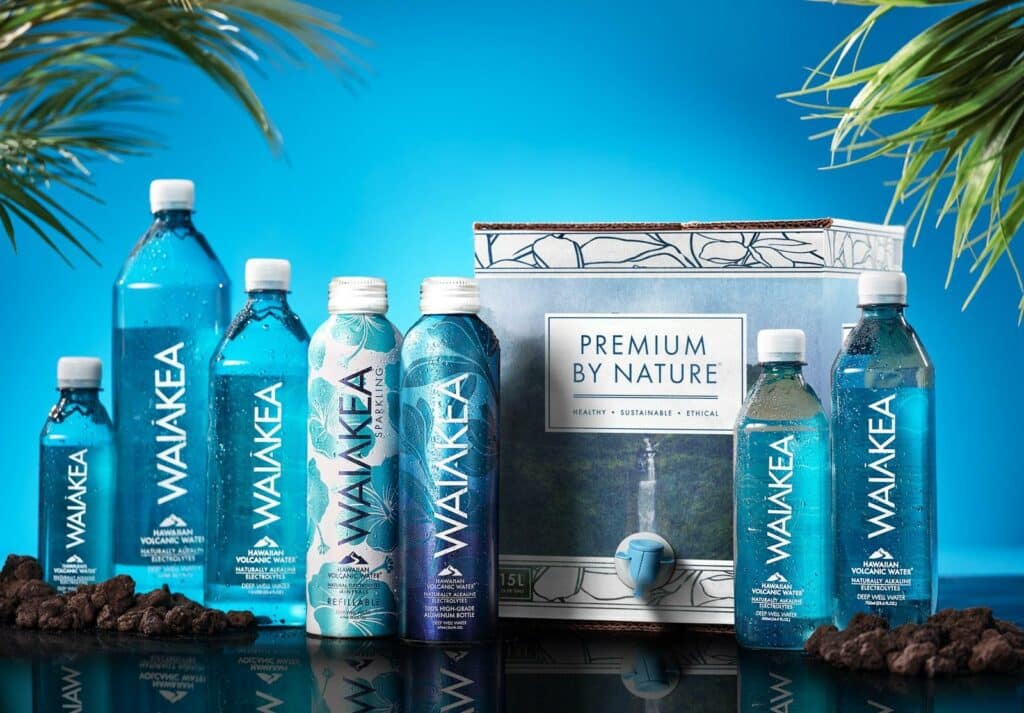
Waiākea’s water has a balanced electrolyte body with 7 mg/L calcium, 4 mg/L magnesium, 4 mg/L sulfate, and 2 mg/L potassium. It also contains 44 mg/L silica, which gives it a smooth and light mouthfeel.
Finally, it has a naturally alkaline makeup, with a pH ranging between 7.6 to 8.2.
Mananalu
Mananalu is a purified water company founded by the famous actor Jason Momoa. Since its conception, it has been operating on two main principles: producing high-quality purified water with added electrolytes, and eliminating plastics from the bottled water industry.
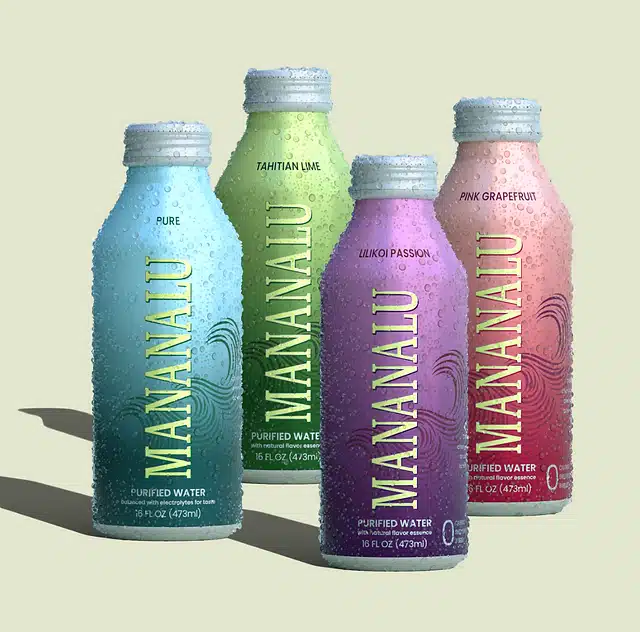
To uphold the first principle, the brand triple-filters its water in a process that includes techniques like reverse osmosis. Post-filtration, magnesium sulfate, calcium chloride, and potassium bicarbonate are added to the water to improve its taste and health benefits.
To honor the second, the brand bottles its water only in infinitely recyclable, refillable, and reusable aluminum containers.
What are the Health Benefits of Electrolyte Water?
Electrolyte-rich water comes in two forms: heavily treated water with added electrolytes and natural spring or mineral water with organic electrolytes. Both have their benefits.
Brands add electrolytes to their treated water to optimize athletes’ (and others who engage in heavy physical activities) hydration needs. The additives replenish muscles and improve oxygen flow.
The benefits of spring or mineral water depends on the electrolyte content. The benefits of the most common electrolytes found in spring or mineral water are described below.
- Calcium: A mineral that’s essential for maintaining bone and muscle health. In children, it helps with bone and muscle growth. Research shows an average citizen’s daily calcium intake is way below the recommended levels. If this is one of your concerns, it’s best to opt for calcium-rich water since our bodies absorb calcium better from drinking water than other sources (such as milk and vegetables).
- Magnesium: The countless benefits of magnesium include regulating blood pressure, nerve and muscle functions, and maintaining healthy biochemical reactions. Like calcium, our daily magnesium intake is likely to be below the recommended levels.
- Potassium: Involved in an even wider array of bodily functions than magnesium. Some of these functions include blood pressure, urination, kidney health, and bone growth. You won’t be surprised to learn that, like calcium and magnesium, our diet often doesn’t meet our daily potassium requirements.
- Bicarbonates: Bicarbonates make water more alkaline. As such, they play a huge role in maintaining blood pH.
- Chloride: It’s one of the minerals responsible for the fact that the digestive assistance of mineral water is considered an excellent companion to heavy dishes like steak. In addition to its digestive properties, it improves nerve actions and oxygen flow, making it a crucial mineral for athletes.
- Sodium: Sodium is an essential mineral as it maintains bodily fluids and ensures our muscles and nerves can function properly. However, sodium deficiency is non-existent in America. On the contrary, the standard American diet has too much sodium. As too much sodium increases blood pressure, authorities recommend a low- or no-sodium diet to those who have or carry the risk of cardiovascular diseases.
